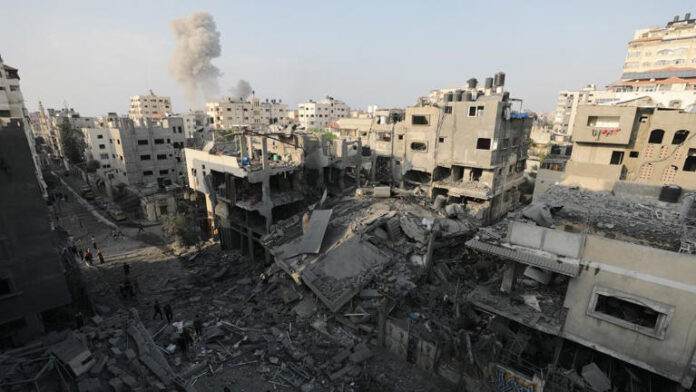Thousands of people rushed into the major UN agency’s warehouses and distribution hubs in the central and southern portions of the enclave on Sunday, “taking wheat, flour, and other basic survival items,” raising concerns that “civil order is starting to break down.”

The UN Relief and Works Agency for Palestine Refugees in the Near East (UNRWA) announced in a statement that supplies from humanitarian convoys arriving from Egypt are stored in one of the warehouses in the central Gazan city of Deir al Balah.
“This is a concerning indication that, after three weeks of fighting and a strict closure on Gaza, civic order is beginning to collapse. “People are scared, frustrated, and desperate,” said Thomas White, the Gaza Strip’s head of UNRWA relations.
sourse : msn.com
According to White, the widespread migration of Palestinians from northern to southern Gaza is severely straining local economies and public facilities, which are already in dire need of repair. “The aid we receive is meager and inconsistent, and the needs of the communities are immense, even for basic survival,” he said.
A day after Prime Minister Benjamin Netanyahu said that Israel has begun the “second stage” of its assault against Hamas, the Israeli military announced on Sunday that it was “increasing the urgency” of its appeals for civilians in northern Gaza to evacuate south. This might lead to an increase in pressure.
Rear Adm. Daniel Hagari, spokesman for the Israel Defense Forces (IDF), issued the alert in a video that was uploaded on Sunday morning. Calls to go south have been met with criticism from the UN and humanitarian organizations, who stress out the difficulties of migrating inside Gaza while it is under bombardment.
The extent to which Gazans got the call is also unknown, since as of Sunday morning, only a portion of the territory’s lines, which had been cut off since Friday night, had been reestablished.
“We are prepared for the lengthy and challenging conflict within the Gaza Strip,” Netanyahu said on Saturday, after the escalation of ground operations into the area where civilians are struggling to live under escalating artillery barrage.
In addition to freeing the more than 200 captives that Hamas took during the terror assault on Israel on October 7 that precipitated the most recent battle, Netanyahu said that his government’s goals were to eliminate the terrorist organization’s “military and governing capabilities.”
Ground troops invaded the region overnight on Friday, according to Israeli authorities, who on Saturday acknowledged a major extension of what they had earlier in the week characterized as “targeted raids” in the Gaza Strip, a Palestinian enclave run by Hamas.
We launched both above- and below-ground attacks. During a simultaneous appearance with Netanyahu on Saturday, Israel’s Defense Minister Yoav Gallant said, “We attacked terrorist operatives at all levels, in all places.”
Near the Israel-Gaza border, CNN reporters reported on a “eruption of activity.” A “step-up” from the previous night’s activities, fighter planes, artillery fire, and “huge flashes on the horizon” were seen by Nic Robertson from Sderot, Israel, on Saturday evening.
The IDF announced in a statement on Sunday that it had attacked more than 450 targets in the previous day, including missile launch pads, command centers, and observation positions.A “sustained humanitarian truce” in Gaza is demanded by 120 states at the UN on Friday, and this coincides with the ground assault and increased shelling.
The most recent statistics given by the Palestinian Ministry of Health in Ramallah♿, which draws from sources in the Hamas-controlled enclave, show that since October 7, Israeli bombardment on Gaza have resulted in at least 7,950 deaths and over 20,000 injuries.
More than 1,400 people were murdered in Hamas’s first surprise strikes on Israel earlier this month, the majority of them were civilians.
“Serious implications” for peace in the area
Following Israel’s intensified military operations in Gaza, Iran, Saudi Arabia, and Egypt have all issued warnings about the potential for regional stability to become unstable if Israel keeps up its ground operations.
Saudi Arabia’s foreign ministry said in a statement on Saturday that it “condemns and denounces any ground incursions” by Israeli soldiers into Gaza because of the effects on civilians.
According to the statement, Israeli military action “against (Saudi Arabia’s) brotherly Palestinian People” would have “serious implications on the international and regional peace and security” as well as the stability of the area.
The Middle East “will become a ticking time bomb,” according to Egyptian President Abdel Fattah Al-Sisi, who also cautioned on Saturday that the “expansion of the conflict” was not in the best interests of the area.
Israel has “crossed the red lines” in Gaza, according to Iranian President Ebrahim Raisi, who added that this “may force everyone to take action.”
Raisi said on X, previously known as Twitter, “Washington asks us to not do anything, but they keep giving widespread support to Israel.”
Speaking on Saturday from Ramallah in the occupied West Bank, President Mahmoud Abbas of the Palestinian Authority urged the heads of Arab countries to organize an urgent Arab League meeting in reaction to Israel’s assault in Gaza.
According to Abbas, Israel retaliated “with more bombing and destruction,” citing the UN resolution demanding a humanitarian ceasefire.This narrative is evolving and changing.Reporting was contributed by CNN’s Eve Brennan, Richard Allen Greene, Manveena Suri, Adam Brown, Jomana Karadsheh, Abeer Salman, Paul Murphy, Lucas Lilieholm, Amarachi Orie, Zahid Mahmood, Ivana Kottasová, Kareem Khadder, Radina Gigova, Eve Brennan, Ivana Kottasová, and Zahid Mahmood.





